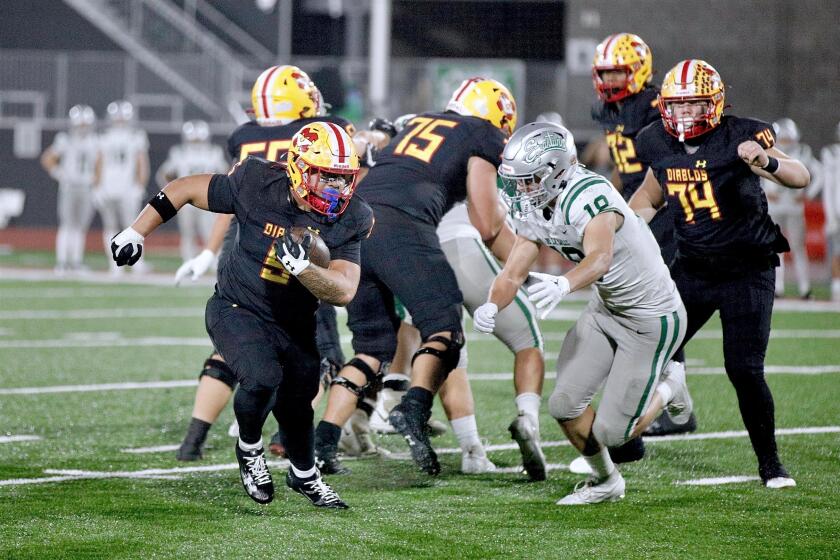The Underdog : That’s What They Call Bellflower’s Dave Chartier, but on a Given Day He Can Beat Anyone at Pool
A pool player for life, Dave Chartier entered the bar last weekend with his cue case strapped to his back. Though he weighs 260 pounds, his nickname isn’t “Fats” but “Underdog”--which, in this tournament, he was.
Chartier, 38, of Bellflower, pulled from the case his $550 ebony-and-ivory stick and prepared to shoot for the $3,500 top prize in the Southern California 9-Ball Championship at Yankee Doodles in Long Beach.
He had lost his first match in the double-elimination tournament the night before, blaming lack of sleep, and faced an uphill struggle against some of the best pros and semipros in the West. He was acquainted with all of them.
“In one session, I’m capable of beating anyone,” said Chartier, who considers himself among the top 25 players in California.
Real Estate Agent
But because he had been working up to 120 hours a week as a real estate agent and as proprietor of the Billiard Palace in Bellflower, Chartier said he hadn’t played enough to be consistent. “That’s what it takes to win tournaments,” he said. “You can’t just beat two or three guys; you have to get by eight or 10 in a row.”
Chartier walked down to a huge carpeted room in which mirrors made the number of pool tables look infinite. Flags hung from the ceiling. Fans barely stirred the smoke that shared the air with rock music. Chartier wiped humidity from his cue.
He said he was nervous, but not like in the old days. “I know I’m still going to eat tomorrow. And you can see, I like to eat.”
His bulk, much of it protruding from his T-shirt, did not make Chartier cumbersome around the table. He stalked it with the grace all good players have, deftly dodging waitresses and players shooting at the next table. He screwed the chalk on the tip of his stick, leaned on the green felt and shot, spinning a ball hard toward a pocket. It disappeared with a decisive thud.
Chartier showed no emotion. His hair covered his ears and swooped over his forehead like a helmet, framing a soft face on which his eyes, nose and mouth were small and expressionless.
He did not talk to his opponent, Jeff Mujica. “Because I don’t want him talking to me,” Chartier explained. “I’m easily distracted. You learn to tune out, but it’s hard. If you’re playing good, you don’t hear anything. If you’re not, they could drop a pin across the room and it would shatter your eardrum.”
Chartier won six straight games for a 9-3 victory. (In 9-ball, players shoot at nine balls numbered 1 through 9, with the object being to sink the 9. A player must win nine games to win the match.)
“There’s no feeling like when that last 9-ball drops in the pocket,” Chartier said.
As a pool devotee, Chartier would rival Minnesota Fats. “I’ve got four or five pool cues under my bed, one in the trunk of my car and five pool tables in my garage,” he said over a soft drink after his Friday match.
He grew up in Inglewood, brushing tables at age 11 to play for free. He was a part-time road player until he was in his 30s, taking month-long trips by motor home, hustling in 30 states. When he started, he was known as “Denver Dave,” although he had never been to Denver.
“I was basically a low-price pool player, $10 a game, although I have played for $100 a game,” Chartier said. “It was more of a sport with me; I never tried to take a person’s last dime.”
He can recall having his last quarter taken in Tucson and being $2,000 ahead two weeks later, although expenses ate up a lot of that. He knew who the the best players were in each town, so he could avoid them, and he knew the joints where the action wasn’t worth getting robbed.
“It’s not a good lifestyle; it wears you out,” he said. “After a month, you want to go home.”
A former Army medic, Chartier worked at VA hospitals and sold cars, cemetery plots, watches and rings. “Pool helped pay the bills,” he said. He always wanted his own poolroom and finally could afford one after he started in real estate in 1984.
The sport has become more respectable since the days when Chartier would “almost apologize for being a pool player.”
“A lot of people still look down on pool as a barroom game,” he said. “We don’t have alcohol in our place; it’s family-oriented.”
He has won more than 200 tournaments, including the Montana State 8-Ball in 1980. His biggest purse was the $2,701 he won last year for finishing third at the Disneyland Open.
“I’d like to see a pro tour where a guy could make a decent living,” Chartier said. “But money isn’t the main reason players play. We just like to compete.”
Balls scattered as Chartier broke to begin his early Saturday afternoon match against Frank (The Barber) Almanza of Whittier.
“He hasn’t been a barber in 15 years,” Chartier whispered. “I hope he doesn’t give me a haircut.”
This was no hotel tuxedo event: Both men wore jeans.
Although Almanza had won the majority of their previous 30 or so matches, the well-rested Underdog did not count himself out.
The games unfolded in geometric precision, both players angling in shots while imparting English on the cue ball to set up the next shot.
Chartier won the first three games and breezed to a 9-4 victory.
“You played good, David,” Almanza said.
“You get far out ahead, it puts on the heat,” Chartier said. “You can’t afford any bad shots with this group.”
He walked up to the bar area to eat a pizza.
A couple of hours later, Chartier sat blankly while his opponent, Ron Rosas, ran rack after rack, impressing the small gallery of spectators.
Rosas led, 8-4, when Chartier finally got a shot and won a game.
“Four more!” Chartier joked to the men watching.
He broke and the 9 dropped.
“Three more!”
He broke again but nothing dropped. It was his last shot.
“Nice shootin’, Ron,” he told Rosas when the 9-6 match was over. Rosas in turn would lose in a later round of the tournament, won by Keith McCready of Anaheim.
A friend of Cartier’s, who knew him from poolrooms 25 years ago, kidded: “You can’t get into the money?”
“I haven’t been playing enough,” replied Chartier. “I had fun.”
Later, as the Underdog packed away his cue and disappointment, he said, to no one’s surprise: “I’ll be playing this game another 50 years.”
More to Read
Go beyond the scoreboard
Get the latest on L.A.'s teams in the daily Sports Report newsletter.
You may occasionally receive promotional content from the Los Angeles Times.










